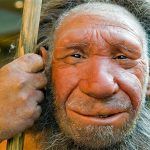Humans are the only animals who seem to blush and shed emotional tears but the etymology team will talk today about blushing.
*ḪJ (Ḫ = German ‘ch’) is a linguistic root called mono syllabic root morpheme. From it is the suffixed specifier extension ‘*ḪJl’ (*ḪJ+l) “blushing, shyness”. Another suffixed specifier is *ḪJʼ (*ḪJ+ʼ = a very short ‘a’). Here is what Lisan al-Arab, a dictionary compiled more than 700 years ago has to say about it: ḪJʼ “Screw. He ḪJʼ a woman: screwed her. A man who’s sex-mad is ḪJʼa.”
As we tried to determine what category the root was used to express we found three different meanings: 1) ḪJ “a slit”; 2) “a type of wind that blows with dalliance”.
Dalliance is said to be “a casual romantic or sexual relationship. Ex. “Jack was not averse to an occasional dalliance with a pretty girl like Jill.” Also: “a period of brief or casual involvement with something.”
The third meaning is curious: ‘ḪaJḪJa’ “kneeling very quickly and compressingly; hiding in a discreet location”.
The beauty about Arabic lexicographers is that sometimes they give accurate meanings of ancient words but they have absolutely no idea what are they describing or how ancient roots are. For that you need the intervention of etymology.
When an etymologist puts all these words together the category reveals itself as casual sex at prehistoric lightening speed. Young Li finds Oz attractive. To lure him, she walks like a belly dancing wind. When a suitable place is found she kneels very quickly and a free bait is allowed to be taken willingly by the chosen one. She doesn’t even have to undress. She’s already naturally undressed and ready.
So why the blushing?
“Blushing is the involuntary reddening of a person’s face due to emotional stress. Examples of emotional responses that may trigger blushing include embarrassment,anger, or romantic stimulation. Severe blushing is common in people who suffer social anxiety in which the person experiences extreme and persistent anxiety in social and performance situations” (Wikipedia).
So it looks like it is caused by anxiousness of being seen by her family. Husbands and boyfriends as well? Maybe.
Other animals are not thought to blush, only humans. We’ve left Stone Age behind thousands of years ago but people, and especially girls, still blush.
But we have another theory. Blushing makes the cheeks rosier and, like a red healthy apple, the girl becomes instantly edible. And why do they turn aside or hide their face? Probably they don’t want you to know the thing they want but want you to know without wanting to tell you.
Blush away, girls. It goes straight for the heart. Your ancestral mums blushed and look how many billions we are today.
(Visited 22 times, 1 visits today)
Last modified: January 1, 2023



